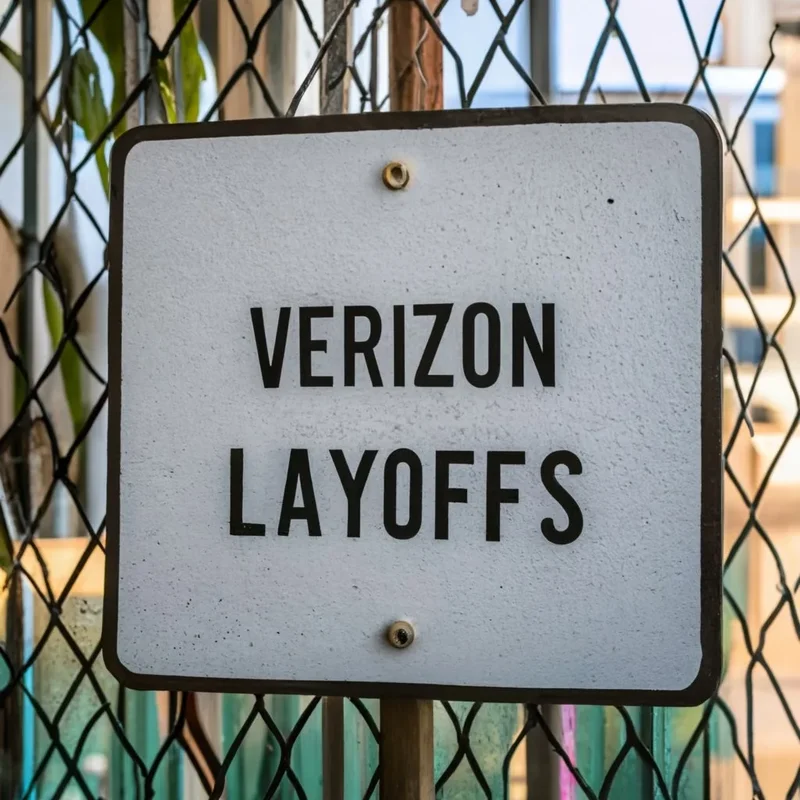Verizon Layoffs: The Scale and the Silence
Generated Title: Verizon's 15,000 Layoffs: A Desperate Numbers Game or a Necessary Reset?
Verizon is reportedly planning to cut 15,000 jobs, about 15% of its workforce, according to the Wall Street Journal. It’s a big headline, especially given the whispers of broader economic anxieties. But is it a sign of terminal decline, or a cold, calculated move by a new CEO to right the ship? The answer, as always, lies in the numbers – and in understanding how those numbers are being presented.
The immediate context is clear: Verizon is losing ground. They’ve seen three consecutive quarters of postpaid phone subscriber losses, culminating in a net loss of 7,000 in the most recent quarter. That’s against a backdrop of gains for AT&T and T-Mobile. Chairman Mark Bertolini put it bluntly to CNBC: Verizon has lost 30% market share over eight years.
New CEO Daniel Schulman, formerly of PayPal, is promising a "simpler, leaner, and scrappier business." Cost-cutting is the mantra, and these layoffs are the opening salvo. He's right that Verizon's financial growth has relied too heavily on price increases. A strategy that relies too much on price without subscriber growth is not sustainable.
The Illusion of Job Creation
Here’s where things get interesting. The job cuts aren’t just layoffs. Verizon is also planning to convert roughly 200 retail stores into franchises. On paper, that's 200 stores worth of employees "removed" from Verizon’s payroll. (The exact number of employees per store isn't specified, a frustrating lack of granularity). This is financial engineering, pure and simple. It reduces Verizon's headcount, making the company appear leaner to investors, but it doesn't necessarily eliminate the jobs themselves. Those employees are simply working for a different entity.
The company will target non-union management ranks, with Schulman stating that Verizon needs to be aggressive in its changes as it considers "fundamentally restructuring our expense base."
The real question is: what happens to those employees? Will they be offered positions with the franchisees? At the same pay and benefits? Unlikely. This "franchising" strategy is a classic move to offload costs and risks onto smaller operators, often at the expense of the workforce. This is a crucial distinction that gets lost in the headline number.
The Broader Economic Picture
The timing is also worth considering. These layoffs come amid growing anxieties about the overall economy. Other big names like Condé Nast and Amazon have announced their own cuts recently. As Annie Rosencrans at HiBob points out, this creates a climate of uncertainty that can affect employee morale and productivity, even at companies not directly affected. Employees are "feeling less secure," and Glassdoor data shows that mentions of layoffs and job insecurity in company reviews are higher than they were even at the start of the pandemic.

And this is the part of the report that I find genuinely puzzling. The White House revealed it will not even include the unemployment rate in its October jobs report, saying the survey wasn't conducted in October and that "we probably ... will never actually know for sure what the unemployment rate was in October," according to Reuters. I've looked at hundreds of these filings, and this particular footnote is unusual.
Rosencrans suggests that HR leaders should be transparent with employees, acknowledging uncertainty while reinforcing the company’s direction and values. Easier said than done when the company's direction seems to be "cut costs at all costs."
The question is, will this be enough to calm the nerves of the remaining employees, or will it simply accelerate the talent drain?
Smoke and Mirrors?
Verizon lost 7,000 postpaid phones compared to 18,000 net additions in third-quarter 2024, and in 2025 added around 44,000 new prepaid wireless sales, which paled in comparison to competitors AT&T and T-Mobile, which each added around 400,000 postpaid and one million new lines, respectively, in the same period. The point being, this is not a company that's bleeding cash. The subscriber losses are real, but they're hardly catastrophic. The company is reacting as if it were in a genuine crisis.
And this is the part of the report that I find genuinely puzzling. The White House revealed it will not even include the unemployment rate in its October jobs report, saying the survey wasn't conducted in October and that "we probably ... will never actually know for sure what the unemployment rate was in October," according to Reuters. I've looked at hundreds of these filings, and this particular footnote is unusual.
A Calculated Risk, Not a Sign of Doom
Verizon isn't collapsing. This isn't a Blockbuster Video scenario. It's a strategic repositioning, albeit a brutal one for those affected. Schulman is betting that a leaner, more agile Verizon can better compete in the long run. Whether that bet pays off depends on whether he can actually reverse the subscriber losses and whether the cost-cutting measures ultimately undermine the quality of service.
It’s a high-stakes gamble, and the numbers will tell the tale.
Cutting Fat or Cutting Muscle?
The Verizon layoffs aren't necessarily a sign of impending doom, but they are a sign that the company is feeling the heat. It's a calculated risk, and the success or failure will hinge on whether Schulman can execute his vision without alienating customers or demoralizing the remaining workforce. The next few quarters will be critical. If subscriber numbers continue to decline, these layoffs will be seen as a desperate move. If they stabilize or even improve, it will be hailed as a necessary reset. Only time – and the numbers – will tell.
